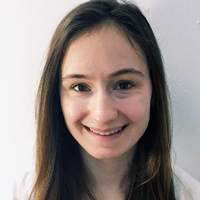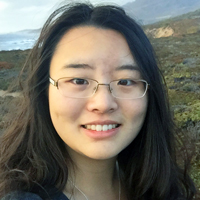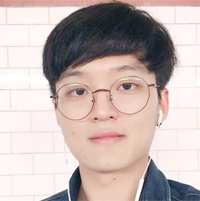Undergrads Terra Blevins, Ruoxin (Amy) Jiang, and Jun Ho Yoon recognized for research
Three undergraduate computer science majors have been recognized by the Computing Research Association (CRA) for showing outstanding research potential in computing research.

For her work on natural language processing, Terra Blevins (CS’17) was named a finalist for the Outstanding Undergraduate Researchers award. Since her sophomore year she has been doing research in the lab of Kathy McKeown, working on a number of projects including automatic language generation, a task that relies on constructing templates that identify slots where nouns or other entities should go; a typical template might be “[number] people were killed in the [event] in [city]” with each slot updated for new events. Generating language using templates is manually intensive, and the language created in this fashion is often generic and repetitious, lacking the natural variation of human-generated language. The project for which Blevins is being recognized tackles both problems: automating the creation of templates while employing paraphrasing to insert more variation for more naturalness. Rather than gathering paraphrases from pairs of similar, or aligned, corpuses—where sentences from one text map to corresponding sentences in the second (as in two different translations of a French novel to English)—Blevins worked with her colleagues to automatically generate paraphrases from the unaligned corpus of Wikipedia articles. Sentences that corresponded with one another were identified using clustering techniques that analyzed semantic similarity. Blevins is coauthor of the paper describing the method. A second project on which she works aims to predict gang violence by automatically analyzing the language contained in tweets circulating among gang-involved youth.
Blevins hopes to continue her work in natural language processing and is currently applying to graduate schools.

The research for which Ruoxin (Amy) Jiang, BS’17, received honorable mention revolves around the complex issue of computer security, specifically on exploring ways to streamline the API libraries (SSL) used by developers to make their applications secure. The sheer number of API functions contained in these libraries and the complexity of some can overwhelm and confuse developers, leading security vulnerabilities that result from incorrectly selecting and using the functions. Under the guidance of Suman Jana, Jiang has been measuring how much of the SSL API space is actually used by existing applications, and what part goes mostly unused. The ultimate goal is to identify common API usage patterns across different applications, and reduce the unused API space. Specifically, Jiang analyzed the usage of OpenSSL API in 32 popular open source programs, applying several techniques (k-means clustering, hierarchical clustering, frequent itemset mining) to identify common patterns. In promising results, she found that the applications studied used only 24% of all OpenSSL API functions, demonstrating that the OpenSSL API can be significantly simplified without compromising application functionality.
After graduation, Jiang will continue on at Columbia to finish her Master’s in computer science.

Jun Ho Yoon (CS’17) received an Honorable Mention for the CRA Outstanding Undergraduate Male Researchers Award for his work on machine learning and computational genomics. Working in Itsik Pe’er’s computational biology lab, Yoon helped develop a hierarchical Bayesian nonparametric model for variation of gene expression, a computationally challenging problem due to operating in the genome-wide space, and one not easily handled by classical machine learning techniques. To scale the work for the large number of variables to be inferred, Yoon helped develop a GPU implementation of the algorithm, first learning the GPU programming language CUDA to do so. He applied the model to real data, revealing new regulatory structures.
Prior to joining Pe’er’s lab, Yoon took two PhD-level courses about Bayesian frameworks for machine learning and furthered his understanding through research projects about topic models under the guidance of David Blei. After graduation, Yoon hopes to continue researching machine learning as a PhD student.
Posted 12/22/16

